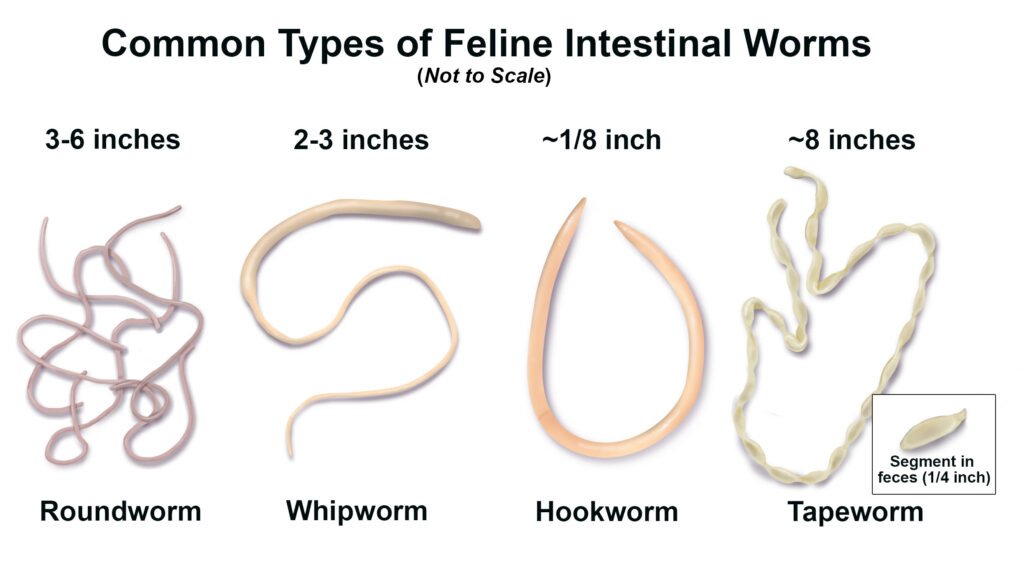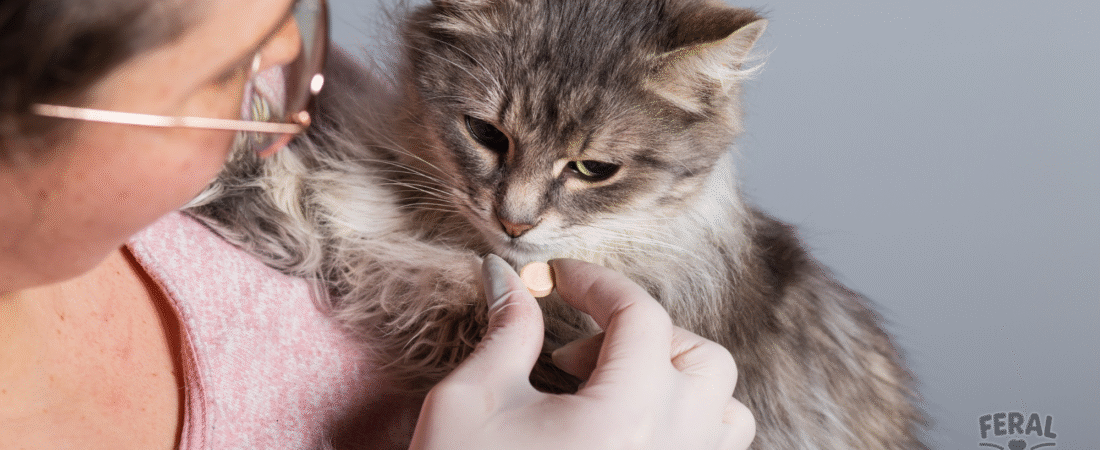Internal parasites—often just called “worms”—are a common threat to cats worldwide. Even indoor cats are not safe, as parasite eggs, fleas, and insects often make their way inside the home. These pests live in the intestines or other organs, feeding on blood or nutrients, and can cause illness ranging from mild digestive upset to life‑threatening anemia.
In this article, we’ll cover the most common parasites in cats, how they spread, symptoms to look for, veterinary treatments, and holistic kitchen-based supports to help keep your feline friend healthy.

📌 Types of Internal Parasites in Cats
Below are the main parasites cats face, with simple explanations of what they do:
- Roundworms (Toxocara cati):
The most widespread parasite in cats. Long, spaghetti‑like worms that live in the intestine and steal nutrients, leaving kittens bloated and malnourished. - Hookworms (Ancylostoma tubaeforme):
Thin worms that attach to the intestinal wall and feed on blood. They cause serious anemia, especially dangerous for kittens. - Tapeworms (Dipylidium caninum, Taenia spp.):
Flat segmented worms spread mainly by flea infestations or hunting prey (mice, birds). Segments look like grains of rice around the anus or in stool. - Whipworms (rare in cats):
More common in dogs, but rare cases affect cats, causing chronic diarrhea and weight loss when present. - Protozoa (Giardia, Coccidia):
Microscopic single‑celled parasites that cause watery, foul‑smelling diarrhea. Can quickly dehydrate kittens. - Heartworms (Dirofilaria immitis):
More common in dogs, but even one or two worms in cats can cause respiratory distress or sudden death. Cats cannot be treated once infected, making prevention crucial.
🦠 How Do Cats Get Internal Parasites?
- From mothers: Kittens often get roundworms via milk while nursing.
- Fleas: Ingested during grooming, they transmit tapeworm larvae.
- Hunting prey: Rodents, birds, cockroaches, and insects can carry larval forms.
- Soil, feces, or dirty litter boxes: Eggs get stuck on paws and ingested.
- Water: Standing water can harbor Giardia or Coccidia.
- Mosquito bites: Transfer heartworm larvae directly into the bloodstream.
Even strictly indoor cats are at risk. Shoes, fleas, and house pests can still introduce parasites to your home environment.
🚨 Symptoms of Internal Parasites in Cats
Symptoms vary by parasite type, but common warning signs include:
- Pot‑bellied appearance (especially kittens): Typical of roundworms.
- Diarrhea, sometimes bloody or mucusy: Seen with hookworms, protozoa, or heavy tapeworm loads.
- Vomiting worms: With roundworms, cats may throw up long spaghetti‑like worms.
- Visible rice‑like segments near anus or bedding: A sign of tapeworms.
- Weight loss despite eating well: Intestinal parasites compete for nutrients.
- Dull coat, poor grooming, slow growth: Especially in kittens.
- Pale gums, lethargy, collapse: Hookworm anemia can be life‑threatening.
- Coughing or difficulty breathing: In heartworm cases, larvae migrate to lungs.
⚠️ Some cats show no obvious symptoms while still spreading eggs to the environment.
🔍 Diagnosis
Vets diagnose internal parasites using:
- Fecal exam (microscopy): Detects parasite eggs or cysts in stool.
- Antigen/PCR tests: Identify hard-to-detect protozoa like Giardia.
- Blood tests: Required for heartworm detection and assessing anemia.
- Visual confirmation: Owners may notice worms in stool, vomit, or bedding.
Since egg shedding is irregular, vets may ask for multiple stool samples on different days.
💊 Veterinary Treatment
Each type of parasite requires specific medications:
- Pyrantel pamoate or fenbendazole: Kill common roundworms & hookworms.
- Praziquantel: Highly effective against tapeworms. Available as injections, oral, or spot-on formulations (like Profender® for cats).
- Antiprotozoals (Metronidazole, Sulfadimethoxine): Treat Giardia & Coccidia.
- Monthly parasite preventatives: Selamectin (Revolution®), Moxidectin (Advantage Multi®) protect against multiple worms and fleas.
- Re-dosing is critical: Eggs and larvae mature at different times. Cats often need follow-up doses every 2–3 weeks.
⚠️ Cats are sensitive to many drugs. Never give human dewormers or over-the-counter dog products.
🌿 Holistic & Kitchen Supports for Cats
While not a cure alone, holistic methods support recovery, reduce worm loads, and discourage reinfection when combined with veterinary care.
- Pumpkin seeds (ground, raw, unsalted):
Contain cucurbitacin, which can paralyze and expel worms.- How to use: ½ tsp sprinkled into wet food daily.
- Grated carrots or zucchini (tiny amounts):
Add fiber that helps push parasites, mucus, and eggs through the intestines. - Coconut oil/flakes:
Contains lauric acid, which has mild antiparasitic properties.- How to use: Just ⅛ tsp oil or unsweetened flakes mixed with food a few times a week.
- Apple Cider Vinegar (ACV):
Makes the digestive environment less hospitable for worms.- How to use: Only 1–2 drops mixed into water or food. Cats are sensitive to taste.
- Probiotics (pet-specific or goat kefir in small amounts):
Restore healthy gut balance after deworming treatment.
⚠️ Avoid toxic ingredients like garlic, onions, essential oils, or dog herbal blends.
🏡 Home & Environmental Care
- Scoop and replace litter daily—eggs become infective within 1–2 days.
- Wash litter trays weekly with hot water and soap.
- Wash bedding and toys in hot water every week.
- Vacuum/mop floors to remove sticky eggs that cling to dust and fur.
- Use strict flea control to break the tapeworm cycle.
- Cover sandboxes and prevent stray cats from toileting there.
🛡️ Prevention
- Kittens: Deworm starting at 2 weeks of age, then every 2 weeks until 12 weeks, monthly until 6 months.
- Adults: Fecal exams every 6–12 months and routine monthly preventatives.
- Indoor cats: Still need protection—fleas and tracked-in eggs keep them vulnerable.
- Vet check-ups: Annual physical + fecal scan ensures no hidden infestations.
🌱 Quality of Life
- With prompt veterinary care, cats with parasites recover well.
- Holistic supports restore gut health, coat quality, and immune strength.
- Ongoing prevention prevents dangerous reinfections and keeps households safe.
❓ FAQs
Q: Can humans catch internal parasites from cats?
Yes. Hookworms can penetrate skin, and roundworm eggs can infect organs/eyes in children. Good hygiene dramatically reduces risks.
Q: Can indoor cats really get worms?
Absolutely. Fleas, insects, or soil from shoes bring eggs and larvae indoors.
Q: Do natural remedies alone clear parasites?
No. They improve resistance and gut health, but serious infestations need veterinary meds.
Q: How often should I deworm my cat?
Kittens: every 2 weeks until 12 weeks old.
Adults: every 3–6 months or year-round monthly preventatives.
💡 Final Thoughts
Internal parasites are among the most common health threats in cats. While veterinary treatment is the gold standard, holistic supports like pumpkin seeds, coconut, and probiotics make intestines less parasite-friendly and help recovery.
✅ Key takeaway: Use vet deworming + holistic supports + strict hygiene for comprehensive protection from worms in cats.

